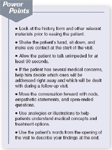Article
Patient Communication: Getting what you need
Author(s):
Open communication fosters better medicine and can reduce noncompliance, bad outcomes, and, possibly, malpractice suits.
Physicians, famously, are always in a hurry. An oft-cited study showed that doctors interrupt patients an average of 18 seconds into their description of the presenting problem. You may think you're saving time by interjecting so soon, but this abruptness can backfire on you. That's because bpatients, in essence, are customers, and as such they can take their business elsewhere-or express their displeasure with poor "service" in myriad ways: noncompliance, missed appointments, and even legal action.
"A successful office visit goes a long way toward ensuring that patients adhere to treatment and follow-up plans, and it's a critical element in patient-and physician-safety," says Gerald B. Hickson, associate dean for clinical affairs and director of the Center for Patient & Professional Advocacy at Vanderbilt University Medical Center in Nashville.

Setting the stage for a visit
"Communication may be fostered-or impeded-based on the reception that the patient gets before seeing you," says Hickson. "So make sure that your receptionist, nurse, and other members of your clinical and clerical team make the patient feel welcome and important, and impart the message that the practice is honored to provide care."
It helps to ask patients to fill out a history form once a year, but only if you (1) review the form before seeing the patient, and (2) allow for the fact that these forms don't necessarily contain the whole story, because people might be reluctant to put certain information in writing. Domestic violence, for one, is notoriously underreported, as are STDs. So be sure to ask patients if they want to talk about something that they haven't checked off.
Communications gurus cite a few simple rules for "connecting" with patients early on:
Extend your hand as you enter the room. For first-time visits, shake the patient's hand, introduce yourself, and greet the person by name. Speak in a warm, friendly tone of voice. Don't use adult patients' first names unless they invite you to. Rather, use titles and last names ("Mr. Jones, I'm Dr. Smith."). If you're not sure how to pronounce the patient's last name, do your best, then ask the patient if you're saying the name correctly, says internist Donald W. Brady, associate professor of medicine at Emory University School of Medicine and vice president of the American Academy on Communication in Healthcare. For future reference, and for the benefit of others in your practice, write hard-to-pronounce names phonetically in the record.
Try not to appear rushed. Pull up a chair, sit two or three feet from the patient, and make eye contact. If he's sitting on an exam table, you should sit down too-putting you at eye level, so that you implicitly convey the message that you're not in a hurry and that the patient has your full attention. In a study Gerald Hickson did on why patients sue physicians, one grievance repeated again and again is, "The doctor never once sat down with me."
Briefly tell new patients something about yourself and your practice philosophy. Here's an example: "I've lived in Pennsylvania all my life, and I've been a family physician since 1987. Dr. Miller and I started this practice in 1995. It's a patient-centered practice in which we encourage you to participate in your healthcare decisions."





